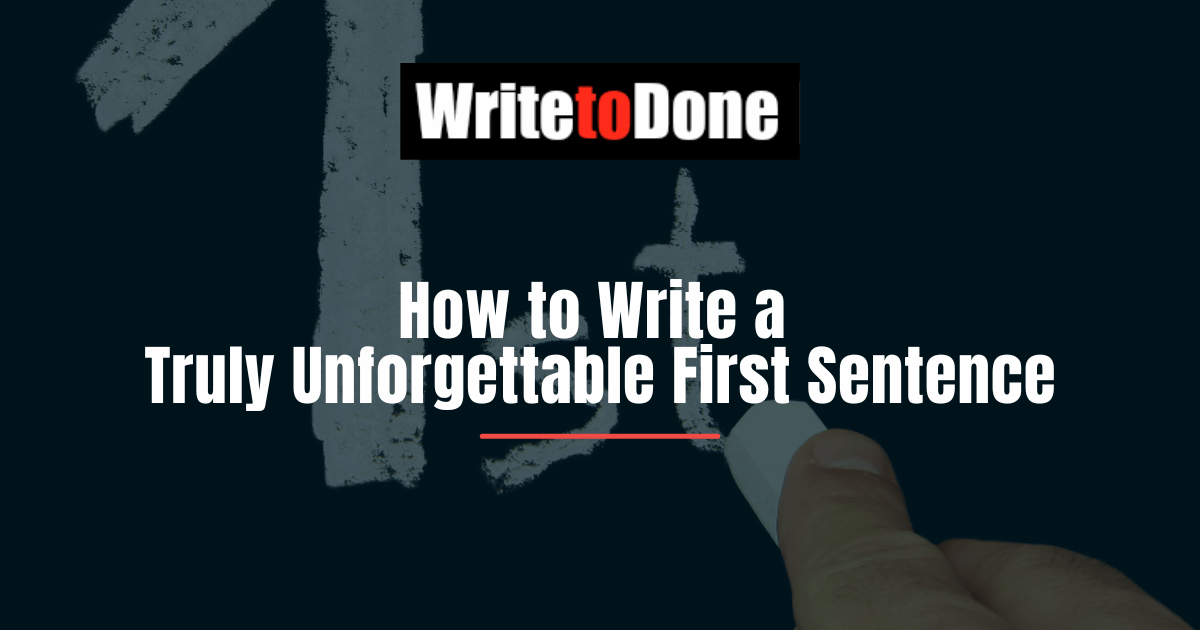We have all done it, stared at that blank page with the desperate urge to write, only nothing comes out. We want to be in the zone. We want words flowing effortlessly from our fingertips. We want characters spouting witty banter that we, as writers, never even knew we had in us.
But, alas… nothing.
Just as the journey of a thousand miles begins with one step, though, every story ever written began with just one sentence. Indeed, some of the most memorable passages in literary history are the opening sentences from classics such as Moby Dick, A Tale of Two Cities, and Anna Karenina. Granted, these books had a lot of other sentences that supported the opener quite well, but without those opening sentences to hook readers, these books may not be held in the same esteem they are today.
What is it that makes a first sentence memorable? It is the hint of something more. It’s the suggestion that builds anticipation for not just the next sentence, but perhaps the next chapter as well.
As writers, one of the best ways for us to undermine the paralyzing power of the blank page is to focus on writing just one sentence. By telling ourselves, we will write one killer opening sentence, we set a manageable goal that, ideally, sets up the next sentence … maybe more. With a few sentences on the page, then, we have a story started.
Here are a few opening sentence examples and why they work.
It was the final flim-flam.
This sentence works because it makes a reader wonder: what was the final flim-flam? what kind of person uses the term flim flam, anyway? And, why was this the final one? Was the last flim-flam so outrageous that there was to be a complete cessation of all flim-flammery?
After regaining consciousness, my brother insisted he was a French ballet dancer and commenced pirouetting around the living room spouting, “Merci, Frommage!”
This sentence works because the reader knows right away that something has happened to cause a character to lose and regain consciousness already. It begs the question: did the brother know ballet and/or French before the blackout? And if so, why is his French so incoherent now? Since this behavior is abnormal by normal standards, is it abnormal by this family’s standards? How old is the brother? Is he 8 or 38? It makes a difference. Finally, will he ever get a, “You are welcome” from the cheese?
Ever since the brain surgery, I forget what I’ve said out loud and what I’ve said to myself.
This sentence works because it suggests the following questions: Brain surgery? What for? What predicament could this lack of internal monologue get this character into? Will it continue to get him/her into trouble? If so, how? Are there any other quarks from the brain surgery, mental or physical? Is this person, in other ways, better off from the surgery? If so, how?
The Secret of the First Sentence
We have looked at a few sentences now and approached them as a reader would. For this exercise to work, you have to do it that way. As writers, we too often think we have to be in control. After all, we are the ones who know where the story is going, right?
When we focus on the first sentence, the goal is to load it in such a way that we are asking the same questions that the reader will be asking. As such, we initiate a game of 20 questions with ourselves. We jot down different answers in our notebooks and decide which one gives us something solid to work with. Before you know it, you have a second sentence… and, ideally, a general sense of where the story might be heading.
The Sentence Journal
The final benefit of this type of exercise is that it doesn’t take very long. If you are anything like me, you have to try to find time to cram writing into your schedule. Sometimes, you may only get 15 minutes of your day for writing. This exercise is perfect for such occasions. In fact, I keep a journal of only first sentences.
This serves a two-fold purpose. First, it allows me to do something productive with limited time. Second, when I have more time to write, I can refer the sentence journal for prompts to kickstart my writing sessions.
Finally, remember that you don’t have to write The Great American Novel every time you sit down to mash the keys. More often than not, a good sentence is all you really need to get a story going. Go ahead, write one and share it in the comments section now.
















